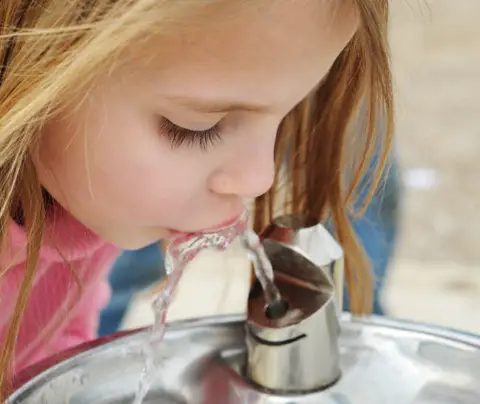RESEARCH TRIANGLE PARK, N.C. — More than 230,000 babies and young children attend licensed child care centers in North Carolina. New rules adopted by the NC Commission for Public Health will ensure that all of those children are drinking water that is free from hazardous lead contamination.
“This is a big win for young children in our state,” said Vikki Crouse, Health Program Associate at NC Child, who helped lead statewide advocacy for the rule. “One of the simplest things we can do to promote children’s healthy brain development is to make sure their drinking water is free from lead.”
Drinking water is required to meet federal standards for lead when it leaves the water treatment plant. However, the pipes, plumbing and faucet fixtures that carry water to the tap are usually the cause of lead in water. Until now, there was no requirement that child care centers check their water for lead contamination at the tap — even though lead is notoriously toxic to the developing brains of infants and young children.
Recent research conducted at local child care centers by RTI International, a nonprofit research institute, found that low levels of lead are common in drinking water. One in six centers tested also had a drinking or cooking tap with very elevated lead. The findings of the Clean Water for Carolina Kids pilot study also showed that with training and support for child care center administrators, testing for lead and taking action to get it out is feasible.
“Young children grow and develop most in their first years of life, and their developing brains are incredibly sensitive to the effects of lead exposure,” said Jennifer Hoponick Redmon, who co-directed the RTI research. “Even low levels of lead are shown to cause permanent cognitive and behavioral changes in children. Fortunately, when you identify where the lead is, there are several simple ways child care centers can get the lead out of their drinking and cooking water without a lot of cost.”
The rule will require all licensed child care centers in North Carolina to test all taps used for drinking and food prep water every three years. If elevated lead levels are found, it must be removed. Child care providers won’t have to worry about the cost of testing for the first year. The NC Division of Public Health has secured federal grant funding to cover those costs. Additional federal grants may be available in the future to pay for the cost of replacing faucets or installing certified filters. In order to take advantage of this funding, child care operators will need to wait until the grant has been awarded, and the Division of Public Health notifies them that they’re ready to begin collecting samples (anticipated soon).
“Our reason for being is the healthy development of young children,” said Patricia Beier, executive director of WAGES, a community organization and HeadStart center in Goldsboro, N.C. “We want to be sure that everything we do promotes that mission, especially when we’re doing something as simple as filling up a child’s drinking cup or making up a bottle of formula.”
Child care centers who find concentrations of lead above the state action level in water taps used for drinking and food preparation, will be required to take action to get their lead levels down. Low-cost actions could include:
- Replacing an old faucet with a new non-brass one;
- Fixing clogged water pipes;
- Installing and maintaining a certified water filter on the tap. Water filters that are certified to remove lead carry an NSF/ANSI 53 seal; and
- Installing and maintaining a water fountain or bottle filling station with an NSF/ANSI 53 certified water filter.
When lower lead levels are found below the state’s action level, child care centers are still encouraged to take preventive steps, since no level of lead exposure is considered safe for children. Those steps can include no-cost methods, such as designating a “clean tap” for drinking and cooking water, and practicing “clean water habits.” Clean water habits include always using cold water for food preparation — even when the water will be boiled, addressing clogs right away and flushing water before use, especially after weekends and holidays. In most cases, bottled water is not recommended, due to the high long-term cost and unknown water quality.
Many child care providers have been part of the effort to study lead in child care water and design effective solutions, including the NC Licensed Child Care Association and the North Carolina Division of Child Development and Early Education. Graduate students and research fellows at Duke University’s Environmental Law & Policy Clinic also contributed invaluable research and analysis to developing a sound rule.
"More than 15 graduate and professional degree students at Duke University conducted research that contributed to this rule change and related efforts to eliminate childhood exposure to lead," said Michelle Nowlin, co-director of the Duke Environmental Law & Policy Clinic. "Working with professionals in public health and early childhood, they brought state-of-the-art science and legal insight to the development of a regulation that will help protect the developing brains of an entire generation of North Carolina children every year. This will be one of the hallmarks of their professional careers."
The rule went into effect on Oct. 1, and licensed child care centers will have a year to get their water tested. NC Child is creating a series of instructional videos in English and Spanish to guide child care providers through the process.

- Recent research conducted at local child care centers by RTI International found that low levels of lead are common in drinking water.
- New rules adopted by the NC Commission for Public Health will ensure that all of those children are drinking water that is free from hazardous lead contamination.
- The rule went into effect on Oct. 1, and licensed child care centers will have a year to get their water tested.
RTI International Media Relations:
As an independent, scientific research institute with a mission to improve the human condition, RTI International is engaged by clients and partners to conduct evidence-based research and project implementation. We share our work in line with journalistic and scientific standards and maintain a record in RTI’s Newsroom.
RTI International is an independent scientific research institute dedicated to improving the human condition. Our vision is to address the world's most critical problems with technical and science-based solutions in pursuit of a better future. Clients rely on us to answer questions that demand an objective and multidisciplinary approach—one that integrates expertise across social, statistical, data, and laboratory sciences, engineering, and other technical disciplines to solve the world’s most challenging problems.
For more information, visit www.rti.org.


